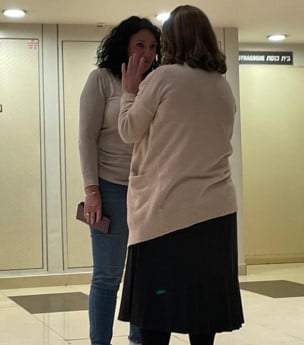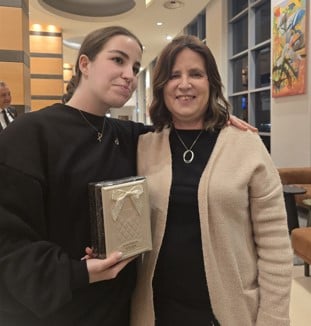
Schneider’s journey with the families of Israel’s hostages did not begin with a grand strategy, but with a deep, empathetic connection to their suffering—one that ultimately reignited the nation’s faith.
By Linda Argalgi Sadacka, Exclusive to World Israel News
In times of profound adversity, certain individuals emerge as beacons of hope, transforming personal anguish into collective resilience. Tzili Schneider, founder of Kesher Yehudi (Jewish Connection), is one such figure. Her journey with the families of Israel’s hostages did not begin with a grand strategy, but with a deep, empathetic connection to their suffering—one that ultimately reignited the nation’s faith.
A mission born from heartbreak
Moved by the plight of parents, siblings, and children of those taken captive, Tzili immersed herself in the protest tents of Tel Aviv and Jerusalem, offering support in the only way that truly mattered: by listening. She posed a pivotal question to these families:
“What do you desire most?”
The answer was immediate and unanimous: “Our children.”
But then she asked a deeper question:
“From whom are you seeking their return?”

Tzili Schneider (back shown) comforts Merav Gonen, mother of freed hostage Romi Gonen. Door on right leads to a synagogue. (Courtesy)
The realization was profound. Beyond political figures, beyond military strategies, beyond backdoor negotiations—their hope rested in a higher power: God.
It was this moment of clarity that led Tzili to propose something radical: a national call for faith—a single, unified Shabbat (Sabbath) observed across the country as a plea for divine mercy.
This was not a tactical maneuver. It was a recognition of an eternal truth: Jewish survival has never been political. It has always been spiritual.
A movement that transcended divisions
The response was overwhelming. Communities across Israel mobilized, bridging gaps between secular and religious Jews in a way that had seemed impossible just weeks before. Through Kesher Yehudi, Tzili spearheaded this unprecedented movement, guiding over 35 hostage families toward a deeper spiritual connection.
This unity was not about external labels. It was about an unshakable Jewish instinct—the knowledge that, in times of crisis, Jews trust one another.
The lookouts stationed on the border, the kidnapped soldiers, the civilians dragged into Gaza—all of them had endured the valley of the shadow of death with one unifying truth:
They never lost their faith.
Faith in the depths of Gaza
These hostages did not emerge from the tunnels of Gaza as the same people they were before. Throughout their captivity, they clung to Jewish identity as a lifeline—observing mitzvot (Torah commandments) wherever and however they could. They fasted on Yom Kippur (Day of Atonement), refrained from eating non-kosher food, and even kept Shabbat in the heart of enemy territory.
The lookouts, in particular, observed several mitzvot together, including Yom Kippur, Tisha B’Av (the Ninth of Av, a day of mourning for the destruction of the Temples), and avoiding chametz (leavened bread) on Pesach (Passover). Not a single one of them agreed to eat chametz throughout the entire holiday. They knew exactly which day was Shabbat and did their best to observe it.
Among them, Agam Berger, an IDF surveillance soldier, became a pillar of strength. Captured during the attack on Nahal Oz on October 7, 2023, she endured 482 days in captivity—and throughout it all, she refused to compromise her faith.
She fully observed Shabbat and refused to eat non-kosher meat, even as her captors starved her. Not once did she break, despite her friends pleading with her to eat for her own survival.
When Agam’s mother, Meirav Berger, learned of her release, she was filled with gratitude—not only for her daughter’s return but for the unwavering faith that sustained her through captivity.
“We saw God with our own eyes”
This was not an isolated phenomenon. Every hostage who emerged from Gaza carried the same testimony:
“We saw God with our own eyes.”
For Romi Gonen, the first girl to be released in the most recent deal, the experience of captivity led to a profound transformation. Her mother, Merav Gonen, was the very first person to sign up for a national Shabbat initiative, dedicating her observance to the release of the hostages.
Exactly one year later, Romi was freed.
When she finally embraced her mother, her first words were not about the suffering she endured. Instead, she declared:
“I am Jewish. I was in captivity, and there I truly felt that I was Jewish. And being Jewish means keeping Shabbat. So from now on, we will keep Shabbat.”
She was not alone.
Kfir Segal, an elderly Jewish man, endured some of the harshest conditions of captivity. His captors starved him, humiliated him, spat on him, and beat him—yet his faith remained unshaken.

Freed hostage Agam Berger, who has spoken publicly about maintaining her faith during captivity, receives a prayer book from Tzili Schneider. (Courtesy)
Upon his release, he turned to his children and made a single request:
“We had 500 days to reflect on ourselves. A lot of time to think. My thoughts led me to God and to the realization that I am Jewish. From now on, I want all of us to sit together and learn about our own Judaism.”
The Kiddush that kept hope alive
Omer Shem Tov was taken captive on Shabbat Kodesh (the holy Sabbath) and remains in captivity to this day. Just a few days after his abduction, by Tuesday or Wednesday, he turned to his friend Itai and asked:
“Shabbat is coming soon. How will we make Kiddush (blessing over wine or grape juice to sanctify the Shabbat and holidays)? I have never missed reciting Kiddush on Shabbat.”
Itai asked their captors about it, and the next day, they received a tiny bottle of grape juice. Omer carefully rationed the bottle, using just a drop each week for Kiddush, knowing that their captivity could last years. Every Shabbat, he recited Kiddush by heart in the darkness of the tunnels.
His mother, Shelly Shem Tov, became fully Shabbat-observant as a result. She joined a group of women learning the laws of Shabbat, determined that when Omer returns, everything in their home will be done according to halacha (Jewish law).
The same was true for Sasha Tropanov, whose mother and grandmother were kidnapped alongside him. They were freed in the first hostage deal over a year ago—and each of them independently decided to become religious.
In a now-viral video, Sasha is seen wearing tefillin (phylacteries) upon his return home this past Shabbat, his first request after being reunited with his family.
His mother, Yelena, always knew that when he came back, he would follow the same spiritual path she had chosen.
Because when you see God with your own eyes, there is no other path.
The time for faith and unity is now
These are not stories of religious coercion. They are stories of spiritual awakening—of Jews who faced the abyss, held onto their identity, and emerged with an unshakable belief in Hashem’s (G-d’s) presence in their lives.
This is the lesson that Tzili Schneider and Kesher Yehudi have been working tirelessly to share: Faith is not a relic of the past. It is the foundation of Jewish survival.
The hostages have returned with a message: Our future belongs to those who stand firm, who hold fast to their faith, and who refuse to surrender—no matter the cost.
Thank you, Jenny Felder, for connecting me with Tzili—and to G-d for making you my neighbor on the plane.
Linda Sadacka is a writer, political strategist, community organizer, and Jewish activist dedicated to combating antisemitism. A delegate for the ZOA in the WZO elections, she works to protect Jewish interests worldwide. Known for her impactful advocacy, media presence, and writing, she actively mobilizes communities and fights for Israel. Follow her on Instagram: @LindaAdvocate
The post The power of faith: How Tzili Schneider became a beacon of hope for hostage families appeared first on World Israel News.